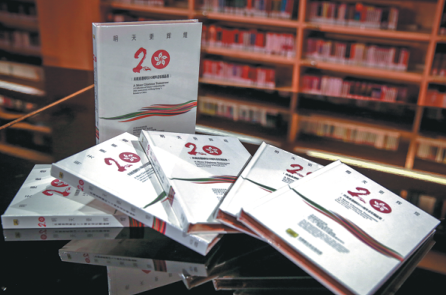Compilation celebrates Hong Kong milestone
 0 Comment(s)
0 Comment(s) Print
Print E-mail China Daily, July 9, 2017
E-mail China Daily, July 9, 2017
To mark the 20th anniversary of the return of Hong Kong to China, China Record Corporation, the oldest and largest record company in China, which was founded in May 1949, has released a 7-CD album, titled "A More Glorious Tomorrow - A Collection of Music Celebrating the 20th Anniversary of Hong Kong's Return to China."
 |
|
7-CD album, "A More Glorious Tomorrow-A Collection of Music Celebrating the 20th Anniversary of Hong Kong's Return to China." |
Nearly 100 songs released between 1984 to 1997 which focus on Hong Kong and its connection with the Chinese mainland, and covering pop, folk music and instrumental performances, are featured in the album.
The corporation is also holding simultaneous exhibitions on the mainland and in Hong Kong, titled The Art-Tune: An Uncommon History in the China Record Industry, to showcase the influence of music from the Chinese mainland on the development of Hong Kong's music industry.
In 1956, the China Record Corporation set up a branch in Hong Kong, to cater to overseas Chinese living across Southeast Asia. Called Art-Tune, the branch released a number of records, comprising traditional Chinese folk music and Chinese operas.
For example, when the Jingju Theater Company of Beijing, the former Beijing Peking Opera Troupe, visited Hong Kong in April 1963, 49 performances were staged in 60 days.
Then, a collection of the performances were released in an album.
Meanwhile, the first display comprising historic photos, program lists, newspaper clippings and record covers is up in Shanghai, where it runs till August 20 at the Shanghai Jiaotong University.
A similar exhibition is now on Beijing at the National Center for the Performing Arts.
Separately, another display will be up at Huang Rong Yuan Tang, a villa on Gulangyu, an island adjacent to Xiamen, where the China Record Museum is located, from July 12 to August 31. The last display will be from August 30 to November 30 at the Hong Kong Central Library.
Fan Guobin, the general manager of the corporation, says Art-Tune helps links overseas Chinese with the Chinese mainland through music.
Looking back, he says the corporation sent teams over 1957-58 to record folk music and opera in the Fujian and Guangdong provinces, where Cantonese music and operas were popular.
And nine albums of Cantonese music and opera were released by the corporation from 1958 to 1963. Art-Tune also released these albums in Hong Kong, and they were well received by music lovers there, says Fan.
The albums appealed not just to Hong Kong music fans, but were used by filmmakers there, especially for martial arts movies during the 1960s.
Referring to the trend, Chang Hok-yan, the chief librarian of the Leisure and Cultural Service Department of Hong Kong Public Libraries, which co-organized the displays, says: "At that time, original film soundtracks were very few. So, most filmmakers borrowed music from the albums, especially traditional Chinese operas and folk music.
"Lots of traditional Chinese music and Peking Opera pieces were used in martial arts movies. And Art-Tune bridged the music gap between the Chinese mainland and Hong Kong then."
Chang, who was born in Hong Kong, graduated from the Chinese University of Hong Kong with a major in Journalism and Communication and a minor major in music. He joined in the Hong Kong Chinese Orchestra as a professional sheng player and later received a master's degree of Applied Science in Library and Information Management from the Charles Sturt University, Australia and a doctorate in Music Librarianship from Middlesex University, in the United Kingdom.
"The music from the martial arts movies is a valuable memory for Hong Kong's audiences. It is also a way of spreading traditional Chinese culture in Hong Kong," he adds.






Go to Forum >>0 Comment(s)